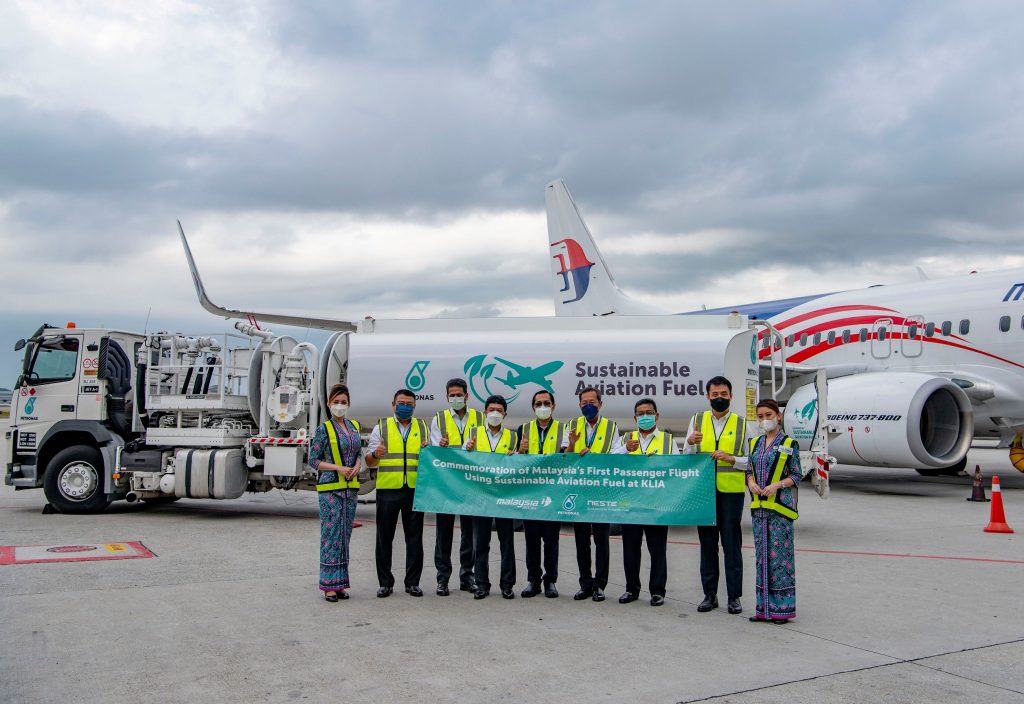Sustainable Fuel from Malaysia: The Key to Lower Emissions in Aviation
The aviation industry, critical for a sustainable future, is transitioning towards eco-friendly practices, especially with Sustainable Aviation Fuel (SAF). Malaysia, a significant player, showcases this shift through an alliance between the Malaysian Aviation Group and Petronas, highlighting its leadership in Southeast Asia’s green aviation. This partnership illustrates a commitment to environmental sustainability and influences the global aviation landscape.

Malaysia Airlines flight MH603 is ready for its first passenger flight using SAF. Photo: Malaysia Airlines
Background on Green Aviation Fuel
Sustainable Aviation Fuel (SAF) is revolutionizing the aviation industry’s approach to environmental sustainability. Unlike conventional jet fuels, SAF is produced from sustainable resources like waste oils, plants, and even algae, offering a cleaner, more sustainable alternative. Its adoption is crucial in the global push to reduce aviation’s carbon footprint, as it can cut greenhouse gas emissions by up to 80% over the fuel’s life cycle compared to traditional jet fuel.
According to the 2023 National Energy Transition Roadmap, Malaysia has initiated a SAF blending mandate starting at 1% and aims to increase this to 47% by 2050. In October 2023, Petronas, the Malaysian state oil firm, and Idemitsu Kosan, Japan’s second-largest oil refiner, entered into a preliminary agreement to jointly work on the development and distribution of SAF. Additionally, in August 2023, Petronas and the Malaysian palm oil board agreed to explore the potential of converting cooking oil and palm oil waste into SAF. Starting next year, Sarawak is set to initiate commercial manufacturing of SAF derived from microalgae. By 2030, Malaysia’s largest state plans to achieve a production rate of 100,000 barrels of SAF daily
Globally, the movement towards SAF is gaining momentum. Initiatives like the Carbon Offsetting and Reduction Scheme for International Aviation (CORSIA) and various national regulations are propelling airlines towards more eco-friendly fuel options. Companies like Neste, SkyNRG, and World Energy are leading the charge in SAF production, with airlines such as United, British Airways, and Qantas integrating SAF into their fuel strategies.
Malaysia, with its rich biodiversity and technological capabilities, is uniquely positioned to contribute to this green transition. The country’s involvement in SAF production not only aligns with its commitment to the Paris Agreement but also leverages its status as a significant player in the biofuel industry. By tapping into its agricultural and technological resources, Malaysia is setting a precedent for sustainable fuel development within Southeast Asia, showing the region’s growing influence in the global green tech movement.
Malaysia’s Position in the Green Aviation Landscape
The country’s aerospace sector has been a significant contributor to its economy, with Malaysia aspiring to become the leading aerospace nation in Southeast Asia by 2030. This ambition extends beyond just manufacturing and maintenance; it includes a robust strategy towards embracing green technology and sustainable practices within the aerospace industry.
Historically, Malaysia has been at the forefront of environmental initiatives in the region. It has made substantial investments in renewable energy sources and has implemented strict environmental regulations to safeguard its rich natural heritage. These efforts provide a strong foundation for its ventures into SAF.
The collaboration between the Malaysian Aviation Group and Petronas marks a significant milestone in this journey. This partnership is not just about producing SAF; it’s about creating a sustainable ecosystem for the aviation industry that can serve as a model for other countries in Southeast Asia. By focusing on the entire supply chain, from the sourcing of raw materials to the production and distribution of the fuel, Malaysia is demonstrating a holistic approach to sustainability in aviation.
Moreover, Malaysia’s strategic location, with its proximity to diverse biological resources and established palm oil industry, presents a unique opportunity to develop biofuels, including SAF. This advantage, coupled with the country’s technological advancements and skilled workforce, positions Malaysia as a crucial player in the global transition towards greener aviation fuels.
Through these initiatives, Malaysia is not only advancing its own green tech and aerospace ambitions but is also contributing significantly to the global effort to combat climate change, highlighting the critical role of Southeast Asia in the worldwide green movement.
Implications for the Aviation Industry
The partnership in the development of SAF has far-reaching implications for the global aviation industry. This collaboration not only showcases the viability of green aviation initiatives but also sets a new benchmark for how airlines and energy companies can work together towards a sustainable future.
Firstly, this illustrates the critical role of sourcing and procurement in the transition to sustainable aviation. By leveraging Malaysia’s rich biodiversity and technological innovation, this alliance demonstrates how localized resources can be utilized effectively to produce SAF. This approach can serve as a model for other countries and regions with similar resources, thereby accelerating the global shift towards greener aviation fuels.
Moreover, the initiative is poised to influence airline operations worldwide. As SAF becomes more accessible and economically viable, airlines are likely to adopt greener fuels to meet regulatory requirements and consumer expectations for sustainability. This shift could lead to a significant reduction in the aviation industry’s carbon footprint, aligning it more closely with global climate goals.
Additionally, the Malaysian Aviation Group and Petronas partnership is likely to catalyze further investment in green aviation technologies. Seeing tangible outcomes from such collaborations can encourage other corporations and governments to fund research and development in SAF production, distribution, and use. This increased investment will not only improve the efficiency and cost-effectiveness of SAF but also drive innovation in other areas of green technology within the aerospace sector.


